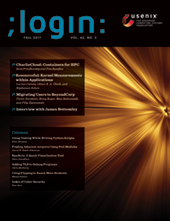USENIX supports diversity, equity, and inclusion and condemns hate and discrimination.
Flipping Out in Computer Science
;login: Enters a New Phase of Its Evolution
For over 20 years, ;login: has been a print magazine with a digital version; in the two decades previous, it was USENIX’s newsletter, UNIX News. Since its inception 45 years ago, it has served as a medium through which the USENIX community learns about useful tools, research, and events from one another. Beginning in 2021, ;login: will no longer be the formally published print magazine as we’ve known it most recently, but rather reimagined as a digital publication with increased opportunities for interactivity among authors and readers.
Since USENIX became an open access publisher of papers in 2008, ;login: has remained our only content behind a membership paywall. In keeping with our commitment to open access, all ;login: content will be open to everyone when we make this change. However, only USENIX members at the sustainer level or higher, as well as student members, will have exclusive access to the interactivity options. Rik Farrow, the current editor of the magazine, will continue to provide leadership for the overall content offered in ;login:, which will be released via our website on a regular basis throughout the year.
As we plan to launch this new format, we are forming an editorial committee of volunteers from throughout the USENIX community to curate content, meaning that this will be a formally peer-reviewed publication. This new model will increase opportunities for the community to contribute to ;login: and engage with its content. In addition to written articles, we are open to other ideas of what you might want to experience.

For a while, every conversation about education seemed to lead to the term MOOC (massive open online course). The hype around such courses seems to have died down to some extent, but MOOCs still exist and are largely good things, even if they have not fulfilled the promise of educating the world. However, there has been an unanticipated side effect to the (forgive me here) MOOC-ification of courses. We suddenly find ourselves in possession of some really high-quality teaching materials. What else might we do with such assets? I’d like to make the point that the wealth of online material opens up the possibility that those of us in the education business can undertake experiments in education that lead to deeper learning. In this article, I’ll focus on the flipped classroom.

